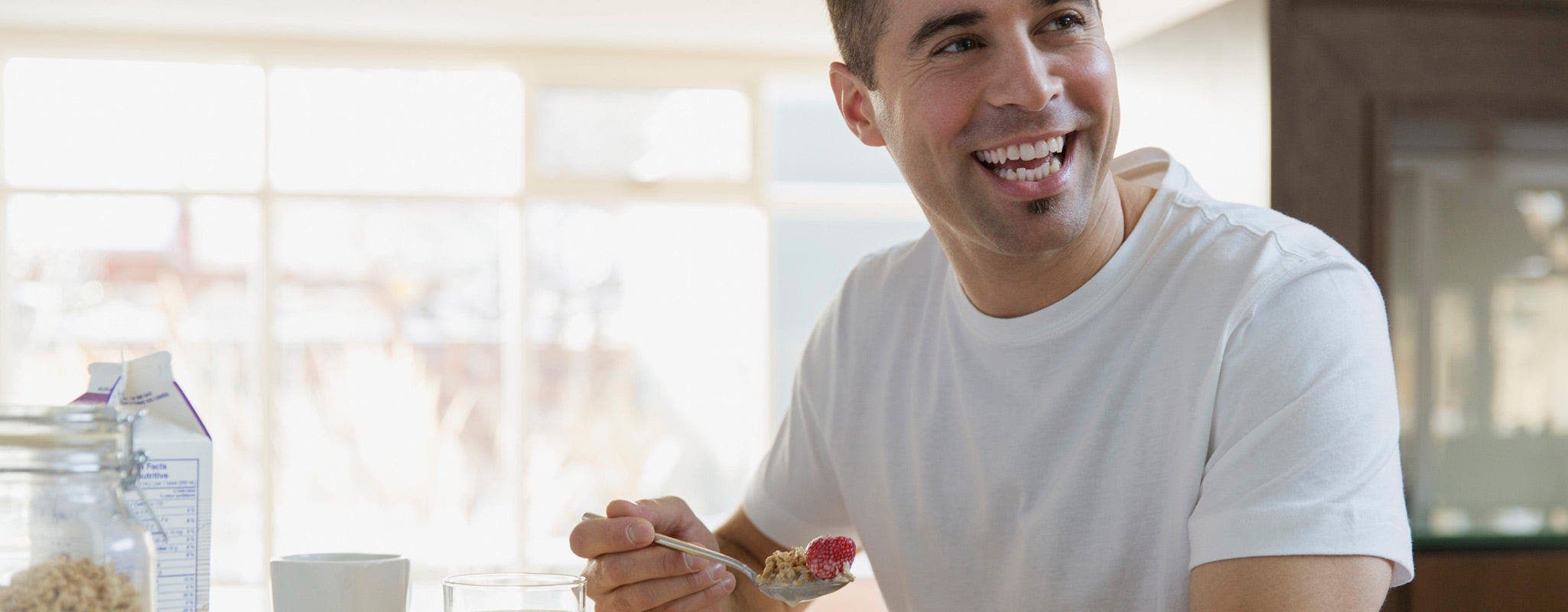A Dieter's Secret Weapon


Here's a thought that'll get you up and running: People who skip breakfast may not be as successful with weight management as those who eat breakfast regularly. Why? Eating breakfast could help you reduce snacking and avoid overeating at later meals.
G. Harvey Anderson, PhD, professor in the Department of Nutritional Sciences at the University of Toronto, concurs: "There are bits and pieces of data that show that breakfast eaters are lighter." Wow, great news! Blueberry pancakes, anyone?
Food is fuel
Eating breakfast is like filling up a gas tank gone dry. When you wake up in the morning, your body is low on fuel, like a car running on empty, explains Kathleen Zelman, RD. So fill up with a morning meal that can kick-start your engine by:
- Giving your body energy to run on.
- Possibly preventing you from overeating later in the day.
Not enough incentive? Try this food for thought: If you skip breakfast, you're often more inclined to make up for it the rest of the day, warns Zelman. And studies suggest that breakfast eaters fall prey to impulse snacking less often than non-breakfast eaters.
Unleaded or diesel?
Not all fuels are created equally. Most people will get more mileage from a small bran muffin and a cup of fat-free milk than they do from a large glass of juice. That's because the sugar in the juice is a much more rapidly used energy source than that derived from the muffin and milk.
"The ideal breakfast is based on carbohydrates and protein," supports Anderson who is currently researching the best meal combination for satiety in appetite studies. He theorizes that the most satisfying breakfasts deliver a quick shot of energy (by raising blood sugar levels rapidly), and then a longer term energy boost from high-fibre, complex-carbohydrate, protein-containing foods that slow digestion.
What does that mean for your sugar cereal? Toss a handful into a bowl of low-fat yogurt, and then mix it up with some fibre-rich fruit. Other tasty tag-team breakfasts include:
- Low-fat cheese and tomato slices on a whole-wheat English muffin.
- High-fibre cereal with fat-free or low-fat milk and dried or fresh fruit.
- Peanut butter and jelly on multi-grain bread.
- Hard-boiled or scrambled eggs (or egg whites) with a couple of wheat crackers.
- Low-fat yogurt and a grain-rich cereal bar.
- A banana and a small handful of peanuts or almonds.
Banish 'No-time-for-breakfast' excuses
Excuse: I don't have time to make myself breakfast, then the only things available to me at work are doughnuts and cookies from the vending machine.
When time is of the essence, think portable. Try a hard-boiled egg (keep a few handy in the fridge), and a couple of crackers or string cheese and a piece of fruit. And for those real crunch times, keep packets of instant oatmeal, high-fibre breakfast bars and mini boxes of raisins stashed in your desk drawer.
Excuse: I just can't eat before 1:00 p.m.
You don't have to eat when the roosters crow, but it is a wise idea to eat within several hours of waking up. If you can't stomach much, try a few grapes or a wheat cracker and half a glass of juice. After a few days, your body might naturally look forward to this a.m. fuel-up and you can try more substantial meals.
Excuse: I would like to eat breakfast but am afraid it will set my hunger into overdrive.
Many people experience less erratic eating patterns (like mid-afternoon and after-supper munchies) when they eat several small snacks and meals throughout the day. Anderson comments that in addition to being leaner, frequent nutritious mini-meal eaters are often associated with cleaner bills of health as opposed to those who eat one to two big meals per day.
